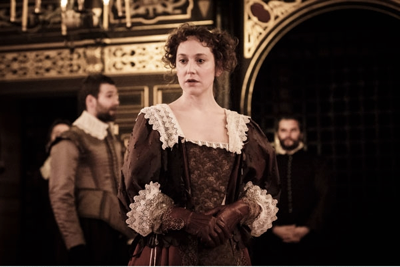
If you sit in the pit watch out for flying gloves…
The death penalty has been imposed by absolute monarchs for much less than writing a play with a preposterous plot. Thomas Middleton and William Rowley must have been just a little relieved that after the 1624 performance of The Changeling before Charles I they didn’t end up in the Tower. Revived at the charming, candlelit Wanamaker Playhouse the co-authored play is a dark Jacobean tragedy of murder and mutilation. But other elements of the plot make even the mistaken identities of plays like Twelfth Night seem highly plausible.

Hattie Morahan as Beatrice-Joanna (photo: Marc Brenner)
In Alicante the youthful, spirited Beatrice-Joanna has been given in matrimony to Alonzo by her father. She however prefers Alsemero, so plots with her servant Deflores to murder Alonzo. This, as you might expect, has consequences that Beatrice hadn’t envisaged – not least that Deflores demands as payment his mistress’ virginity.
Middleton borrowed the main story of Spanish nobles from a book of cautionary tales entitled The Triumph of God’s Revenge against the Crying and Execrable Sinne of Wilful and Premeditated Murder. His peers shared our disapproval of murder, but luckily for him they were much less concerned about copyright – the book had only been published in 1621. Co-author Rowley contributed the exploitative subplot that sees Alibius, overseer of a Bedlam-style institution worry about the loyalty of his young wife Isabella.
At the Wanamaker Hattie Morahan’s outstanding Beatrice is a husky voiced siren who garners our sympathy even during her murderous plotting. She may act selfishly but she is a spoilt, uncertain child rather than an evil Lady Macbeth. Morahan conveys an uncomprehending woman moving from one mistake to the next, amazed at the horrible result each one brings. Modern audiences will lay some blame with her father Vermandero for forcing her into the arranged marriage.
Showing more human selfishness and bad judgement than malice Beatrice grabs at the escape route offered by Deflores. Middleton gave this monstrous manipulator the play’s most amusing lines and with tinkling Welsh brogue Trystan Gravelle makes the most of them, making the servant a hard-to-dislike antihero. Even Deflores is not acting purely from evil but out of a passion for his mistress that he knows will remain unfulfilled – until he spots a way to put her greatly in his debt.
Here unlikely becomes implausible. Worried that her enforced pre-marital liaison with Deflores will be noticed by her husband on their wedding night, Beatrice pays her maid Diaphanta (Thalissa Teixeira) to take her place. Middleton is asking us to accept that Alsemero would not notice a switcheroo between his bride and her maid – not from a distance or up on a balcony, Much Ado style, but in his marriage bed. Here director Dominic Dromgoole plays with this absurdity – not only does Beatrice has long hair and Diaphanta short, but Beatrice is white and Diaphanta black. We do not believe in Middleton’s plot device, and start to ponder Alsemero’s own hypocrisy.
Today fewer people in the audience will believe the fiddle faddle about an elixir designed to tell whether a woman is a maid. The effects on viewers of other parts of the play have also changed over time. The subplot comments on the actions of the main players by taking place amongst the inmates of a madhouse – in the past this would have been a jocular interlude. Now we sit in discomfort – not just from the authentic, backless seats – as Rowley’s madmen are forced to practise a silly dance for Beatrice’s wedding. Britain has become a society happier to witness murder than the mistreatment of the mentally-ill, which may or may not be an improvement.
With minstrels in their gallery, candelabra lighting and actors and audience all in a close, intimate proximity, the new Wanamaker theatre is ideal for a claustrophobic, close-up tragedy. The Changeling as performed here is an atmospheric reflection of human behaviour showing how easily and unexpectedly evil develops. If you’re planning something nefarious and have managed to convince yourself the usual ethical arguments don’t apply, The Changeling may make you change your mind. You might not have to sleep with an assassin, but there will probably be side effects you hadn’t foreseen.
Until March 1st

Leave a Reply